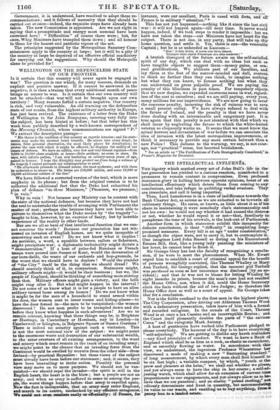THE INTELLECTUAL INFLUENtA.
Tan bigotry which marked every act of John. Bull's• life in: the last generation has yielded to a curious reaction, manifested in a. proneness to remain content in compromises. Even professed statesmen glory in halting between opposite opinions, boast of an intellectual effeminacy which deters them from coming to any conclusions, and take refuge in quibbling verbal evasions. They are irresolute, and call it being impartial. Thus, Lord Lansdowne is in a state of indifference towards the Bank Charter Act, as serene as we are exhorted to be towards all sublunary things. He cares, or knows, as little about it as if his) share in maintaining it were somebody else's statesmanship anti not his own: he would not say whether it had caused the distress or not, whether he would repeal it or not—that, familiarly ton paraphrase the tone of his avowals, is the look-out of Parliamentl, Another form in which statesmen exhibit this incapacity for! definite conclusions, is their " difficulty " in completing long., promised measures. Every bill is an age " under consideration," as though the object were, not to carry it, but to contemplate it. One imagines Lord John Russell so doting on his Encumbered, Estates Bill, that, like a young lady painting the miniature of her lover, he cannot bear to finish it. Sir George Grey has lost the faculty of recognizing a conchs-. sion, if he were to meet the phtenomenon. When Mr. Ewa& urged him to establish a court of criminal appeal for the benefitt of persons wrongfully convicted, like Thomas Whalley or. Mary: Ann Turford, Sir George replied, that the innocent girl Turfordt was pardoned as soon as her innocence was disclosed by an *a., cident]; and that lie was not to blame for letting Whalley lie eight months in prison, because the man's case had not reached; the Home Office, nor, when it did, could the Home Secretary elicit the facts without the aid of two Judges; so therefore the Home Office does as well as a court of appeal. Sir George takes that for a conclusion.
Nor is the foible confined to the first men in the highest places. The City Corporation, after driving out Alderman Thomas Wood with a defamatory persecution, takes leave of him with a formal. and recorded eulogium. In the annals of the Court, Thomas Wood is at once a lax Cassius and an incorruptible Brutus ; and. the Court itself pleasantly doubles the parts of " the envious Casca " and the eulogistic Mark Antony.
A host of gentlemen have rushed into Parliament pledged to please everybody. The humour of the day is to have everything "self-adjusting." We are getting to dislike any harsh reminders —any fixed principles of conduct. We want to have a Bank a England which shall be as firm as a rock, as elastic as caoutchouc, and as smoothly flowing as• water. In accordance with tale view, we understand, the ingenious- Professor Wheatstone has discovered a mode of making a new " fluctuating standard " of long measurement, by which every man shall find himself to be six feet high; a variable compass, by which, " youth at the prow and pleasure at the helm," we shall sail whither we please, and yet always seem to have the ship in her course ; a self-ad- justing watch, which shall allow for an extension of current tinin proportionate to our engagements, and yet always allow us to beta,• lieve that we are punctual ; and an elastic " pound sterling," net odiously determinate and fixed in quantity, but accommodating its value to our wants, and enabling us to buy anything, fronasi penny bun .to a landed-estate.


































 Previous page
Previous page